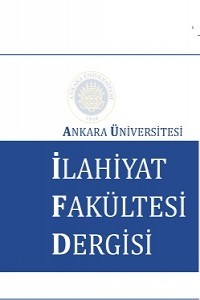İnsanın Temel Ödevlerine Toplu Bir Bakış
___
- El-Âmirî, Ebûl-Ĥasan Muĥammed b. Yûsuf, Kitâbul-Emed alel-ebed, tah. Everett Rowson, American Oriental Series 70, New Have, 1988.
- Berman, Lawrence, The Political Interpretation of the Maxim: The Purpose of Philosophy is the Imitation of God, Studia Islamica, 15 (1961), ss. 53-61.
- Corbin, Henry, History of Islamic Philosophy, terc. Liadain Sherrard, London, 1993.
- _____, Avicenna and the Visionary Recital, terc. W. R. Trask, Irving, 1980.
- El-Endelusî, Śâid, Kitâb Ŧabaqâtul-umam, tah. Louis Cheiħo, Beyrut, 1912.
- El- Fârâbî, Taĥśîlus-saâde, Haydarabad, 1926.
- _____, Risâle fî Žuhûril-felsefe, İbn Ebî Uśaybia, Uyûnul-enbâ fî ŧabaķâtil-eŧıbbâ, tah. Nizâr Riđâ, Beyrut, 1965 içinde, ss. 604-605.
- Gutas, Dimitri, Greek Wisdom Literature in Arabic Translation, New Heaven: 1975.
- _____, Avicennas Eastern (Oriental) Philosophy: Nature, Contents, Transmission, Arabic Sciences and Philosophy, 10 (2000), ss. 159-180.
- _____, The Study of Arabic Philosophy in the Twentieth Century: An Essay on the Historiography of Arabic Philosophy, British Journal of Middle Eastern Studies 29:1 (2002), ss. 5-25.
- Hodgson, Marshall, The Venture of Islam, Chicago: University of Chicago Press, 1974.
- İbn Culcul, Ŧabaķâtul-eŧibbâ vel-ĥukemâ, tah. Fuâd Seyyid, Kahire, 1955.
- İbn Ebî Uśaybia, Uyûnul-enbâ fî ŧabaķâtil-eŧıbbâ, tah. Nizâr Riđâ, Beyrut, 1965.
- İbn Ħaldûn, el-Muķaddime, tah. Alî Abdulvâĥid Vâfî, (Kahire: 1960).
- İbn Hindû, Ebûl-Ferec, el-Kelim al-rûĥâniyye minel-ĥikemil-Yûnâniyye, tah. Muĥammed Calûb el-Ferĥân, Beyrut: 2001.
- İbnul-Ķıfŧî, Târîħul-ĥukemâ, tah. Julius Lippert, Leipzig, 1903.
- İbn Sînâ, Manŧı ķul-meşriķıyyîn, tah. Şukrî el-Neccâr, Beyrut, 1982.
- _____, Risâle fî iŝbâtin-nubuvve, tah. Michael Marmura, Beyrut, 1991.
- _____, Uyûnul-ĥikme, tah. Muvaffaķ el-Cebr, Dimesķ, 1996.
- El-Kindî, Ebû Yûsuf Yakûb b. Isĥâķ, Resâilul-Kindî el-felsefiyye, tah. Muĥammed Abddulhâdî Ebû Rîde, Kahire, 1950.
- El-Mubeşşir b. Fâtik, Muħ târul- ĥikem ve-me ĥ âsinul-kelim, tah. Abdurraĥmân Bedevî, Beyrut, 1980.
- Nasr, Seyyed Hossein, Ibn Sīnās Oriental Philosophy, Seyyed Hossein Nasr and Oliver Leaman (ed.) History of Islamic Philosophy, London, 2001, ss. 247-251.
- _____, An Introduction to Islamic Cosmological Doctrines, Albany, 1993.
- El-Shahrastânî, Abdulkerîm, Kitâbul-Milel ven-niĥal, tah. Muĥammed b. Fetĥullâh Bedrân, Kahire, 1956.
- El-Sicistânî el-Manŧıķî, Ebû Suleymân, Munteħab Śıvânul-ĥikme, tah. D. M. Dunlop, The Hague, 1979.
- Terkan, Fehrullah, İslamda Felsefe Geleneğinin İsimlendirilmesi ve Kökeni Üzere, İslâmî Araştırmalar Dergisi, 19:2 (2006), ss. 297-304.
- Yaman, Hikmet, The Concept of Hikmah in Early Islamic Thought, Yayınlanmamış Doktora Tezi, Harvard University, USA 2008.
- ISSN: 1301-0522
- Yayın Aralığı: 2
- Başlangıç: 1952
- Yayıncı: ANKARA ÜNİVERSİTESİ > İLAHİYAT FAKÜLTESİ
Taberi Tefsir’ini Anlamak Üzerine - I
Kur'ân Âyetlerinin Tarihlendirilmesine Batılı Yaklaşımlar
Kelâmullah Tartışmalarının Dilbilimsel İçeriği
3. Uluslararası İslam ve Biyoetik Sempozyumu
Türk Tarih Kurumu Kütüphanesi’nde Bulunan El Yazması Bir Eser: Atalarsözü Külliyâtı
Yûsuf İle Züleyhâ Aşkının Klasik ve Modern İfadesi: Hamdî ve Nazan Bekiroğlu Örneği
